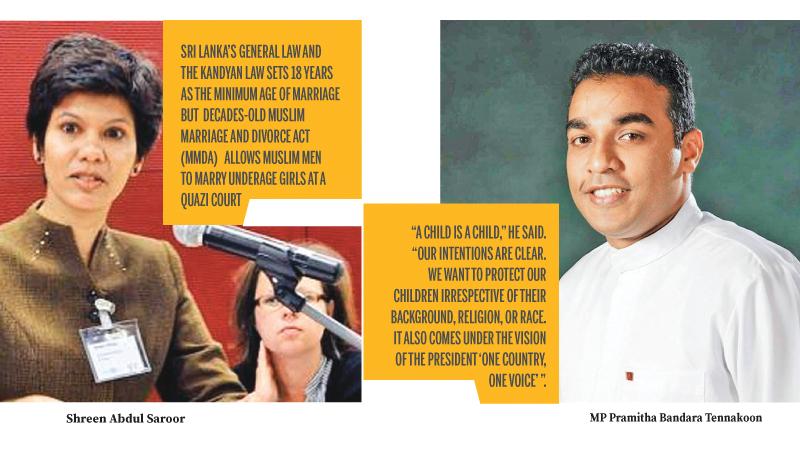
Farah* was only 17 when she arrived at her husband’s home. He was 21 and addicted to drugs.
Scared of what was to come, she refused to enter their bedroom on the first night. Farah said she cried but her parents forced her into the bedroom.
“When I was five months pregnant with our child he left with another woman,” she said.
Poverty pushed her into a second marriage, but that marriage was short lived too.
Her husband died from a gas leak when the couple was working in Saudi Arabia.
Now Farah is 26 and feels helpless.
“I was too young to get married. I didn’t even know what sex was,” she said.
She feels that the Bill which was presented in Parliament to set the minimum age of marriage for all at 18 years will drastically change the lives of Muslim girls, especially those from low economic backgrounds.
“This way the children can finish their education and even be financially independent. They will also have an idea of how to raise a child,” Farah said.
Bill
The Bill presented by Sri Lanka Podujana Peramuna parliamentarian Premitha Bandara Thennakoon this week (August), is a new step towards helping girls like Farah.
MP Tennakoon said his objective is to protect the rights of all children, and its intension is not to marginalise anyone. Sri Lanka’s general law and the Kandyan law sets 18 years as the minimum age of marriage, but the decades-old Muslim Marriage and Divorce Act (MMDA) allows Muslim men to marry underage girls at a Quazi court.
Moreover the MMDA does not indicate a minimum age and a child under 12 years can be wedded off with a special permission from the Quazis.
Since there is no compulsory requirement for the court to check the girl’s birth certificate there have been instances where the marriage registrar would manipulate the real age of the young bride to 18 years or above in his records.
Therefore, it is almost impossible to keep track of how many such marriages take place in the country annually.
Research
MP Tennakoon’s Bill states that ‘underage marriage is an infringement of a young person’s right to education, development and security and as such is considered a serious social evil that may render vulnerable the children of Sri Lanka to forms of physical or mental violence, injury or abuse, neglect or negligent treatment, maltreatment or exploitation, including sexual abuse’.
This is reflected in the findings of Fathima who is working on a paper by researching into 10 case studies of child marriages, where the brides were between 13 to 17, in the North Western Province.
“In most cases these children are married as a result of financial constraints. Their parents’ approve these marriages,” Fathima said.
She shared information of two cases that she is currently studying in her research.
One is of a girl who was married at the age of 13 years by her mother who wished to protect her from her abusive father. She is married to a man who is addicted to drugs.
The second case is of a woman who is in her late 20s now. “Her family forced her to get married at the age of 16. Because she didn’t know how to consummate the marriage her husband became abusive towards her. At the age of 17 she got pregnant with her first child,” Fathima said.
But she miscarried after her husband assaulted her. “Now she is back at home with her parents. Her husband broke her hand and now she is getting a divorce.
She said her school friend who is 29 is getting married this year.”
Statistics
According to statistics by the Women’s Action Network (WAN) which collected data from 350 participants, all child brides, in Puttalam between 2005 and 2015, Ampara and Batticaloa, 85 have undergone abortions.
Nine of the child brides have undergone abortions three times and 34 of them twice. One child, when she got pregnant, was 12 years old.
Not all activists who are pushing for the minimum age of marriage can come out to voice their concerns.
One activist said she received death threats and warnings about abducting her daughter from Islamic leaders if she continued.
Unfazed, activist Shreen Abdul Saroor of WAN, said she is not ready to back down.
“If Muslim MPs have arguments against abolishing child marriage in the name of their religion or just oppose this Bill for the sake of attracting Voters then they are simply doing ethnic politics to secure their vote base,” she said explaining that it is crucial to have the support of parliamentarians to protect the girls from these premature and forced marriages.
MMDA reform
“They (the Muslim MPs) are not even true to themselves because they came up with MMDA reform proposal under the previous government.
That proposed raising the minimum age of marriage and they know child marriage and teenage pregnancy is rampant in their community.”
Former United National Party parliamentarian Dr. Thusitha Wijemanne was the first to introduce the ‘Minimum Age of Marriage’ Bill. She presented the Bill at the end of the previous government’s tenure.
“We researched about this issue. And considering the physical and mental effects on young children drafted this Bill,” Dr. Wijemanne said.
MP Tennakoon said he commended Dr. Wijemanne’s efforts. “We are from two parties but want the same thing for our children,” he said referring to Dr. Wijemanne’s in the to change the existing laws.
This sets a good example of a new government carrying forward the projects taken up by a former government, a rare occasion in Sri Lankan politics.
The Bill will be presented by the Parliament General Secretary’s office to the Attorney General who will study it and take necessary steps to carry it forward.
“It is a long procedure. But I will see it through,” MP Thennakoon said.
*Farah’s name was changed to protect her identity.
